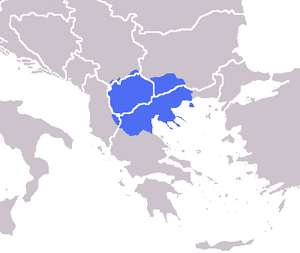Vardar Macedonia

Vardar Macedonia (Macedonian and Serbian: Вардарска Македонија, romanized: Vardarska Makedonija) was the name given to the territory of the Kingdom of Serbia (1912–1918) and Kingdom of Yugoslavia (1918–1941) roughly corresponding to today's North Macedonia. It covers the northwestern part of geographical Macedonia, whose modern borders came to be defined by the mid-19th century.
History
[edit]Vardar Macedonia usually refers to the central part of the region of Macedonia attributed to the Kingdom of Serbia by the Treaty of Bucharest (1913) after the Balkan Wars. The territory is named after Vardar, the major river that cuts across the region from northwest to southeast,[1] to distinguish it from both Greek Macedonia and the region around the Pirin Mountain in Bulgaria.[citation needed]
The region was initially known as Serbian Macedonia[2][3] although the use of the name Macedonia was prohibited later in the Kingdom of Yugoslavia, due to the implemented policy of Serbianisation of the local Slavic-speakers.[4][5] From 1919 to 1922, the area (including parts of today Kosovo and Eastern Serbia) was part of South Serbia (Serbian: Jужна Србија, Južna Srbija),[6][7][8] In 1929, the Kingdom of Yugoslavia was divided into provinces called banovinas. Vardar Macedonia as part of South Serbia then became part of Vardar Banovina.[9]
During World War I it was occupied by Bulgaria as part of the Military Inspection Area of Macedonia. After the war the present-day Strumica and Novo Selo municipalities were broken away from Bulgaria and ceded to Yugoslavia. During the Second World War, Bulgaria established two administrative districts in the region – Bitola and Skopje. In 1946, most of Vardar Macedonia as one of the six constituent countries of SFR Yugoslavia became the People's Republic of Macedonia (1946–1963),[10] which was later renamed to Socialist Republic of Macedonia (1963–1991). Before the independence of the Republic of Macedonia, the region was also called Yugoslav Macedonia.
After the breakup of Yugoslavia, besides North Macedonia, the region encompasses also Trgovište and Preševo municipalities in Central Serbia,[11] as well the Elez Han municipality in Kosovo.[12]
See also
[edit]- Macedonia (Greece)
- Geography of North Macedonia
- Macedonia (terminology)
- Pirin Macedonia
- Vardar statistical region
- Ottoman Vardar Macedonia
References
[edit]- ^ Dimitar Bechev (2019). Historical Dictionary of North Macedonia (2nd ed.). Rowman & Littlefield. p. 302. ISBN 978-1-538-11962-4.
- ^ Popovic, P. (2018). Serbian Macedonia: An Historical Survey. Creative Media Partners, LLC. p. 1. ISBN 978-0-344-87197-9.
- ^ Treanor, P.J. (2019). Britain, Bulgaria, and the Paris Peace Conference, 1918–1919: A Just and Lasting Peace?. Lexington Books. p. 26. ISBN 978-1-4985-8563-7.
- ^ Donald Bloxham, The Final Solution: A Genocide, OUP Oxford, 2009, ISBN 0199550336, p. 65.
- ^ Chris Kostov, Contested Ethnic Identity: The Case of Macedonian Immigrants in Toronto, Peter Lang, 2010, ISBN 3034301960, p. 76.
- ^ Victor Roudometof, Collective Memory, National Identity, and Ethnic Conflict: Greece, Bulgaria, and the Macedonian Question, Greenwood Publishing Group, 2002, ISBN 0275976483, p. 102.
- ^ Constantine Panos Danopoulos, Dhirendra K. Vajpeyi, Amir Bar-Or, Civil-military Relations, Nation Building, and National Identity: Comparative Perspectives, Greenwood Publishing Group, 2004, ISBN 0275979237, p. 218.
- ^ Roland Robertson, Victor Roudometof, Nationalism, Globalization, and Orthodoxy: The Social Origins of Ethnic Conflict in the Balkans, Greenwood Publishing Group, 2001, ISBN 0313319499, p. 188.
- ^ War of words: Washington tackles the Yugoslav conflict, p. 43, at Google Books
- ^ Loring M. Danforth (1997). The Macedonian Conflict: Ethnic Nationalism in a Transnational World. Princeton University Press. p. 66. ISBN 978-0-691-04356-2.
- ^ Петър Христов Петров, Македония: история и политическа съдба, том 3, Изд-во "Знание" ООД, 1998, стр. 109.
- ^ Стефан Карастоянов, Косово: геополитически анализ, Университетско издателство "Св. Климент Охридски", 2007, ISBN 9540725410, стр. 41.
Further reading
[edit]- Danforth, L.M. (1997). The Macedonian Conflict: Ethnic Nationalism in a Transnational World. Princeton University Press. p. 44. ISBN 0-691-04356-6
- Alice Ackermann (1999). Making Peace Prevail: Preventing Violent Conflict in Macedonia. Syracuse University Press. pp. 55–. ISBN 978-0-8156-0602-4.
- Ilká Thiessen (2007). Waiting for Macedonia: Identity in a Changing World. University of Toronto Press. pp. 29–. ISBN 978-1-55111-719-5.
- Hugh Poulton (2000). Who are the Macedonians?. C. Hurst & Co. Publishers. pp. 2–. ISBN 978-1-85065-534-3.
- Stefan Troebst (January 2007). Das makedonische Jahrhundert: von den Anfängen der nationalrevolutionären Bewegung zum Abkommen von Ohrid 1893-2001 ; ausgewählte Aufsätze. Oldenbourg. pp. 344–. ISBN 978-3-486-58050-1.
- Dimitar Bechev (13 April 2009). Historical Dictionary of the Republic of Macedonia. Scarecrow Press. pp. 232–. ISBN 978-0-8108-6295-1.
